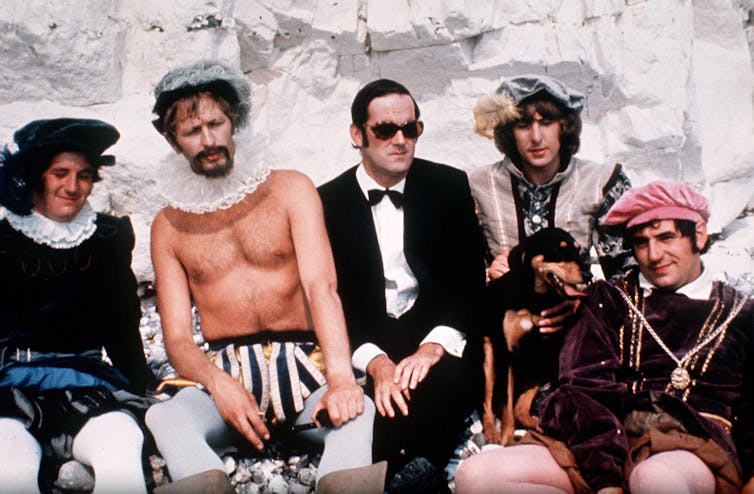Content of this type normally assert that a word’s appropriate this means lies in its earliest employs, even though later on developments are corruptions. Disinterested doesn’t mean “not interested” but “impartial” they complain. Decimate should refer to the destruction of specifically one particular-tenth of anything they protest. Fulsome can only indicate “insincere” somewhat than “very full” they cry.
While this may seem sensible more than enough, in some conditions it does not quite do the job. In this article we apply the theory of earliest meaning to five common words and we get some relatively surprising final results.
1. Rather
This word is from Old English prættig, “cunning”, from præt “trick” – unrelated to prat “idiot”, which initially referred to the buttocks (that’s why pratfall: a tumble on to the backside).
By the 15th century, very explained some thing cleverly designed, suave or ingenious. This led to its use to explain anyone attractive or fantastic-searching – most normally a female or kid, though the diarist Samuel Pepys refers to a person Dr Clarke as a “very very man”.
Ironic utilizes of very to refer to a thing uncomfortable are the origins of phrases like “pretty pass”, “pretty condition of affairs” and “pretty kettle of fish” the latter far more usually discovered in the phrase “different kettle of fish”. The kettle below isn’t the form we use to make tea, but rather a huge cooking vessel (from Latin catillus).
2. Tall
Tall is from an Outdated English term that intended “swift” or “active”. By the 15th century, it had arrive to necessarily mean “handsome” or “elegant”. Its use to necessarily mean “skilful” gave rise to the expressions “tall of hand”, meaning “handy” and “tall of tongue”, which means “good at arguing”.
The 16th century noticed the emergence of takes advantage of relating to height subsequent metaphorical extensions contain “large”, as in “tall order”, and “exaggerated”, from which the phrase “tall story” emerged. These improvements in that means may appear to be shocking, but numerous prevalent adjectives that describe our physical appearances started daily life referring to dexterity and pliancy. Handsome, as the title indicates, at first meant “easy to handle”, “clever” intended “dexterous”, and “buxom” intended “obedient” (from “bow” meaning “to bend the neck”).
3. Foolish
Another person foolish in Old English was “happy” or “fortunate”, and afterwards “pious” or “holy”. Due to the fact the harmless are simply taken edge of, it came to signal a man or woman considered “weak” or “helpless”. Even more destructive associations are apparent from its use to necessarily mean “rustic” or “lacking sophistication”, from which our present day sense of “foolish” emerged.
This approach, whereby a compliment becomes a term of abuse, is recognized to linguists as “pejoration” (from Latin peior “worse”). Its opposite, “amelioration” (from Latin melior “better”), can be observed in the heritage of “nice”, which originally intended “foolish” (from Latin nescius “ignorant”).
4. Naughty

Trinity Mirror / Mirrorpix / Alamy
In Previous English, to be naughty was to be bad, pretty much “to have naught” or “nothing”. It was later on utilized to describe someone immoral and, in a weakened perception, mischievous or disobedient. The specific association with badly behaved kids led to the “naughty corner” – a area of isolation to which a baby may possibly be sent as a punishment.
Perhaps it was the naughty corner’s Victorian associations that led to the invention of the “naughty step”, a sort of self-control advocated by the British actuality Tv set clearly show Supernanny, whose transatlantic achievements led to its adoption in the US.
Its use to signify “indecent” survives into present day utilization in phrases like “naughty but nice”. This phrase was promoted by adverts for product cakes in the 1980s and was the brainchild of the novelist Salman Rushdie, while he was doing the job as a copywriter. “Naughty bits”, referring to the genitals, was 1st recorded in a Monty Python sketch in 1970. This euphemism was regarded far too explicit for American audiences and was bleeped out when the demonstrate was broadcast in the US.
5. Unfortunate
This word is from Old English sæd, which intended “full”, as the German satt however does. In English, it has been replaced in this feeling by “satisfied” or “sated”, from Latin satis “enough”.
By the 14th century, unfortunate meant “settled”, “firm” or “resolute” and from this the senses “serious” and “grave” made.
The contemporary use of unhappy to imply “sorrowful” can be traced back again to Previous English, the place the phrase presently carried a feeling of becoming weary or drained of a thing, reflecting the way that gratification speedily shades into ennui. Amazingly, “happy” was introduced to us by the Vikings who plundered the north of England and is borrowed from the Outdated Norse happ, which filled the hole produced by the modifying use of “silly”. It initially intended “fortunate” – a perception preserved in the phrase “by pleased chance”.
To propose that we are employing words improperly, thus, is to ignore the many methods in which meanings of words and phrases alter in excess of time. In the scenario of fulsome, “very full” is the previously of the two senses. Its use to imply “excessive” arose out of “fulsome apologies” that ended up felt to be insincere – as Priti Patel uncovered to her price tag in her resignation letter of 2017.
The looser use of decimate to suggest “devastate” is recorded from the 17th century, so can it genuinely be erroneous now? And if we did insist on only sanctioning its earliest use – set to dying a single in each ten of an military of mutinous soldiers – how usually would we use it? So come to feel free to be disinterested in this publish, or to lavish it with fulsome praise. Trying to constrain the makes use of of terms is plain silly – in its modern-day relatively than its medieval this means.
